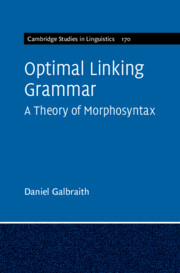6 - Faroese Passive
Published online by Cambridge University Press: 20 April 2023
Summary
Chapter 6 presents new data on Faroese personal and impersonal passives, in addition to a discussion of case preservation and availability of passive with the dative-subject verbs. First, data from further Faroese surveys are investigated. The analysis demonstrates that the proposed constraints regulating the passive, here simply the addition of PARSE, covers all relevant sentence types in both Faroese and Icelandic personal passives, and with DEP and ARGSP also the impersonal passives. The argumentation builds on Kiparsky (2013), providing additional empirical support for the Linking Theory approach. An important finding is that the facts of case substitution in the active and case non-preservation in the passive are related: it is argued that there are preserving versus non-preserving grammars, represented by the two competing rankings. Speakers have access to both rankings, and choice of verb strongly predicts which grammar is activated. This approach predicts patterns that emerge from the constraint rankings themselves. The non-preserving grammar (activated, for example, with uses of the verb ‘like’) implies availability of passive and nominative substitution, both of which hold true; likewise, the preserving grammar predicts unavailability of passive and case substitution, which again turn out to be true for the verb ‘need’.
Keywords
- Type
- Chapter
- Information
- Optimal Linking GrammarA Theory of Morphosyntax, pp. 138 - 156Publisher: Cambridge University PressPrint publication year: 2023

